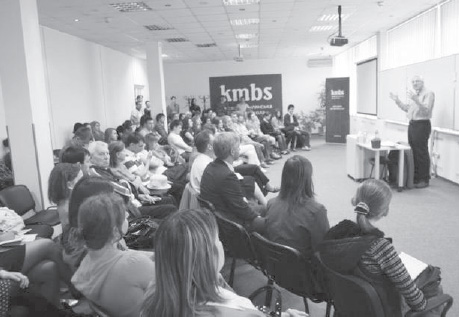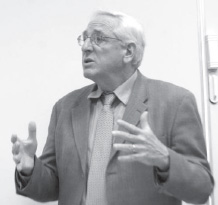Kyiv Mohyla Academy Publishes Translation of “Stalin’s Genocides”
 (NaUKMA)
At the initiative of the National University of Kyiv-Mohyla Academy, the
University’s publishing house received exclusive rights for the Ukrainian
translation and publication of the book “Stalin’s Genocides” by historian and
acclaimed author Norman M. Naimark. The original in English was published by Princeton
University Press in 2010. The author attended a press conference and
presentation of the Ukrainian translation, which took place in Kyiv at the
offices of UNIAN information news agency and at the University on May
10-11, 2011.
(NaUKMA)
At the initiative of the National University of Kyiv-Mohyla Academy, the
University’s publishing house received exclusive rights for the Ukrainian
translation and publication of the book “Stalin’s Genocides” by historian and
acclaimed author Norman M. Naimark. The original in English was published by Princeton
University Press in 2010. The author attended a press conference and
presentation of the Ukrainian translation, which took place in Kyiv at the
offices of UNIAN information news agency and at the University on May
10-11, 2011.
The
presentation and press conference included Kyiv-Mohyla Academy President Serhiy
Kvit, Norman Naimark, historian Stanislav Kulchitskyj of the National Institute
of History of Ukraine,
historian Yuri Shapoval, editor of the Ukrainian translation of the book
“Stalin’s Genocides”, and other distinguished scholars. Norman Naimark is a
professor of modern East European history, specializing in genocide and ethnic
cleansing, Senior Fellow at the Hoover Institution, and Professor of History at
Stanford University.
 Dr.
Serhiy Kvit, stated that “the book was translated by Vasyl Starko into
Ukrainian in record time”. He continued that, “the publication of this book is
of great importance for the world community and is of particular significance
for Ukraine”.
Dr. Kvit said that, “the facts described are crucial for understanding Ukraine’s
historical memory and for further documentation of events and decisions which were
hidden by government security services as classified information.”
Dr.
Serhiy Kvit, stated that “the book was translated by Vasyl Starko into
Ukrainian in record time”. He continued that, “the publication of this book is
of great importance for the world community and is of particular significance
for Ukraine”.
Dr. Kvit said that, “the facts described are crucial for understanding Ukraine’s
historical memory and for further documentation of events and decisions which were
hidden by government security services as classified information.”
At the
press conference, Prof. Naimark stated that he had access to archival data in
his research work that “provided evidence that Stalin’s crimes, ranging from
the early 30s to the Second World War, were acts of genocide.”
In his
study, Prof. Naimark examines Stalin based on his biography and concludes that
the dictator indeed engaged in ethnic cleansing. The tragic acts which
transpired during Stalin’s period represent the most reprehensible and tragic
episodes of destruction of human beings including the elimination of so-called
“kulaks”, the man-made famine in Ukraine of 1932-1933, national cleansing and
the Great Terror of 1937-1938. He highlights these events in the context of other
examples of genocide. The author compares the crimes under Stalin to those of
Adolf Hitler.
In view
of the importance of the genocide issue, Prof. Naimark stated he “hopes that
the book will help the Ukrainian people understand its dynamics more clearly”.
In the preface to the Ukrainian edition, Naimark stated that “the key role of
Stalin’s genocidal policy in the 1930s with its antagonistic - one can say
Ukrainophobic - attitude toward the politics, history and culture of the Soviet
Union and its people, especially the Ukrainian peasants, can be characterized
as an inseparable part of the history of genocide in the USSR”. At the press
conference he shared his conclusion that, “Stalin persecuted the Ukrainian
peasants to prevent any struggle for independence, to eradicate a sense of
their nationality, and to prevent any attempt to resist Sovietization”.
Dr.
Stanislav Kulchytskyj stated that in his view, the book “Stalin’s Genocide”
deserves “more attention from the Ukrainian public, and not only from Ukrainians,
but primarily from the Russian public”. According to Dr. Kulchytskyj, “this
book is useful for us primarily because it puts the concept of genocide in a
global perspective.”
The
National University of Kyiv-Mohyla Academy assumed responsibility for the
translation and publication of this historic analysis based on the University’s
mission in education and the belief that a nation’s historical narrative forms
the basis for its shared spiritual, moral, linguistic, and cultural identity.
The information and analysis presented in the book “Stalin’s Genocides” will
form part of the development of contemporary civil society in Ukraine.
Investigation of Stalin’s repressions and policies has become possible in Ukraine only during the last two decades and the
Kyiv-Mohyla Academy has played a crucial role in the
discovery, analysis, and sharing of information of this tragic era.
PHOTOS
1
- Presentation of Ukrainian translation of "Stalin's Genocides" by
Norman Nalmark
2
- Norman M. Naimark, author
 (NaUKMA)
At the initiative of the National University of Kyiv-Mohyla Academy, the
University’s publishing house received exclusive rights for the Ukrainian
translation and publication of the book “Stalin’s Genocides” by historian and
acclaimed author Norman M. Naimark. The original in English was published by Princeton
University Press in 2010. The author attended a press conference and
presentation of the Ukrainian translation, which took place in Kyiv at the
offices of UNIAN information news agency and at the University on May
10-11, 2011.
(NaUKMA)
At the initiative of the National University of Kyiv-Mohyla Academy, the
University’s publishing house received exclusive rights for the Ukrainian
translation and publication of the book “Stalin’s Genocides” by historian and
acclaimed author Norman M. Naimark. The original in English was published by Princeton
University Press in 2010. The author attended a press conference and
presentation of the Ukrainian translation, which took place in Kyiv at the
offices of UNIAN information news agency and at the University on May
10-11, 2011. Dr.
Serhiy Kvit, stated that “the book was translated by Vasyl Starko into
Ukrainian in record time”. He continued that, “the publication of this book is
of great importance for the world community and is of particular significance
for
Dr.
Serhiy Kvit, stated that “the book was translated by Vasyl Starko into
Ukrainian in record time”. He continued that, “the publication of this book is
of great importance for the world community and is of particular significance
for